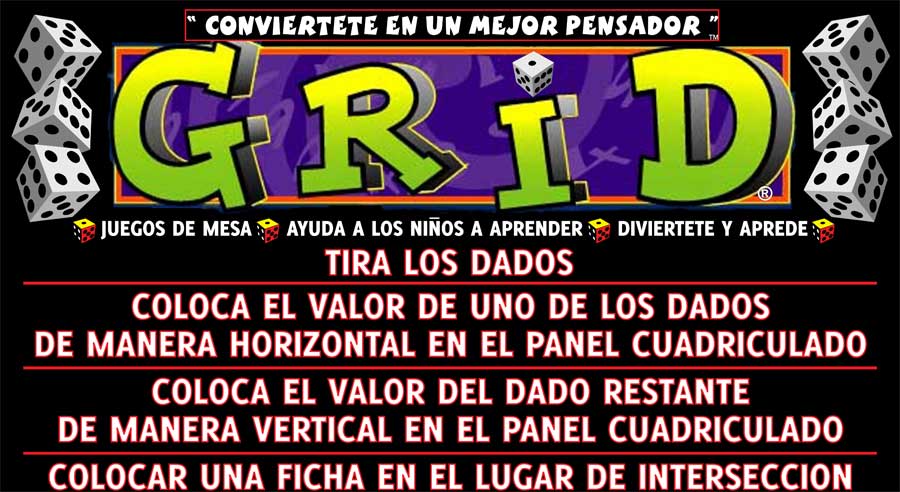WHAT ARE GRID GAMES ALL ABOUT
 games are intended to help people become "BETTER THINKERS".
games are intended to help people become "BETTER THINKERS". games are used for "FUN", "ENTERTAINMENT" & "EDUCATION" purposes.
games are used for "FUN", "ENTERTAINMENT" & "EDUCATION" purposes. games are "FAMILY-FRIENDLY". Children as young as 3 years old can play.
games are "FAMILY-FRIENDLY". Children as young as 3 years old can play. games help adults & seniors "CLEAN THE GEARS BETWEEN THEIR EARS"
games help adults & seniors "CLEAN THE GEARS BETWEEN THEIR EARS" games are "PLAY BASED LEARNING" games that help children have
games are "PLAY BASED LEARNING" games that help children have"FUN FUN FUN" while they "LEARN LEARN LEARN".
 games never play the same way twice, they have "HIGH REPLAY" value.
games never play the same way twice, they have "HIGH REPLAY" value.HOW ARE GRID GAMES PLAYED
Almost all
 games are played using a similar concept.
games are played using a similar concept.The "ROLLING of DICE" provides the "OPPORTUNITIES" but the player must make what he or she feels is the best choice.
The square that is common to both a "VERTICAL" and a "HORIZONTAL" row of squares is called the "INTERSECTION SQUARE" and this is where the action occurs.
Each
 game uses this concept in a variety of ways depending on the
game uses this concept in a variety of ways depending on the  game being played.
game being played.There is more than one way to play each
 game.
game.In some
 games players "COLLECT SHAPES", in some
games players "COLLECT SHAPES", in some  games players "COLLECT LETTERS", in some
games players "COLLECT LETTERS", in some  games players "COLLECT POINTS", in some
games players "COLLECT POINTS", in some  games players "STRATEGICALLY PLACE" their markers in an attempt to win the game.
games players "STRATEGICALLY PLACE" their markers in an attempt to win the game.Check-out the
 games you think you might enjoy.
games you think you might enjoy.WHAT IS GRID
 games is a resource (teaching-tool) designed to introduce and re-enforce visual graph concepts of vertical, horizontal and diagonal grid references.
games is a resource (teaching-tool) designed to introduce and re-enforce visual graph concepts of vertical, horizontal and diagonal grid references. games promotes problem-solving skills, visual discrimination, pattern exploration and the discovery and understanding of number sets sequencing patterning.
games promotes problem-solving skills, visual discrimination, pattern exploration and the discovery and understanding of number sets sequencing patterning. games use markers and value-markers (colored dice) to help students discover, discuss and internalize basic algebraic concepts using "Mental Math".
games use markers and value-markers (colored dice) to help students discover, discuss and internalize basic algebraic concepts using "Mental Math".Markers and value-markers are a manageable, engaging and "FUN" approach that allows students, at all levels (even as young as 3 years of age) to develop and practice the numbering skills of mental calculation, estimation place value and
 offers many levels of challenge that are "SELF-CHECKING" and are appropriate for both individuals and co-operative mentoring groups.
offers many levels of challenge that are "SELF-CHECKING" and are appropriate for both individuals and co-operative mentoring groups. encourages children to visualize 1,2, and 3 digit numbers and be successful in addition, subtraction and multiplication tasks requiring groupings.
encourages children to visualize 1,2, and 3 digit numbers and be successful in addition, subtraction and multiplication tasks requiring groupings.Sequential "HANDS-ON" activities allow students to count, estimate group objects, build numbers and record information all of which are essential for successful computation of whole numbers, fractions and decimals.
 games are accessible to players of all ages since the level of play is determined by their level of mathematical development.
games are accessible to players of all ages since the level of play is determined by their level of mathematical development. games are wonderful for strengthening the often weak areas of mental math, problem solving and creating thinking skills.
games are wonderful for strengthening the often weak areas of mental math, problem solving and creating thinking skills.


Lots of Fun
Helps Kids Learn
Become a Better Thinker
Have Fun and Learn
Fun Games that Help Kids Learn
Fun Game

Beaucoup de Plasir
Aide Les Enfants a Apprendre
Deveivir un Meilleur Penseur
S'Amuser Et Aprendre
Plaisir-Amusant
S'Amusez et Savoir

Mucha Diversion
Ayuda a Los Ninos a Aprender
Conviertete en una Mejor Pensador
Divertete y Aprede
Juegos Divertidos que los Nis Aprendan
Juegos Demesa

Viel Spass
Hilft Kindern Lemen
Werden Sie Besser Auf Denker
Spass Haben und Lernen
Spass Spab, die Kinder Lernen Hilfe
Spass Spab

Un Sacco di Divertimenta
Aiutai I Bambini Imparano
Diventare Meglio a Pensatore
Divertirsi e Imparare
Giochi Divertenti Che Aiutano i Bambini Impara
Divertente

Muita Diversao
Ajuda Criancas Aprendem
Torne se Melhor em Pensador
Se Divertir e Aprender
Jogos Divertidos que Ajudam as Crians a Aprender
Jogos Divertidos

